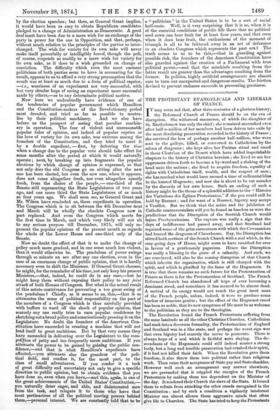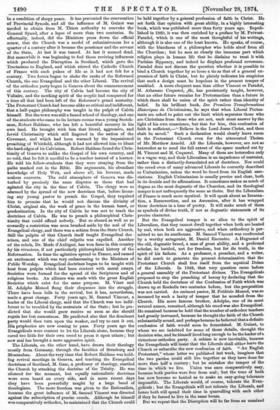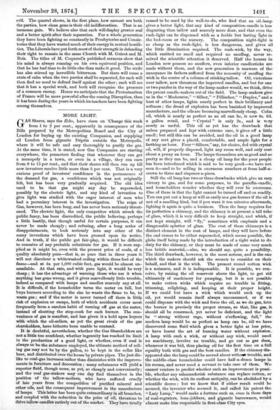THE PROTESTANT EVANGELICALS AND LIBERALS OF FRANCE.
IT may seem sad that, after three centuries of a glorious history, the Reformed Church of France should be on the eve of disruption. She withstood massacres, of which the slaughter of St. Bartholomew was only the chief ; she remained uncrushed even after half-a-million of her members had been driven into exile by the most desolating persecution recorded in the history of France ; she survived the loss of perhaps another half.million, who were sent to the galleys, killed, or converted to Catholicism by the sabres of dragoons ; she kept alive her Puritan ritual and creed in those Churches of the Desert which have added imperishable chapters to the history of Christian heroism ; she lived to see her oppressors driven forth to become a by-word and a shaking of the head unto the nations ; she lived to acquire freedom, equality of rights with Catholicism itself, wealth, and the respect of men ; she has reached what would have seemed a time of millennial bliss to the hunted Hugenots ; and now she is about to be cut asunder by the discords of her own house. Such an ending of such a history might be the theme of a splendid addition to the " Histoire des Variations des Eglises Protestantes," if the pen could still be held by Bossuet ; and for want of a Bossuet, bigotry may accept a Veuillot. But we think that the satire and the jubilation of Catholic controversialists will yet be found as baseless as were the predictions that the Disruption of the Scottish Church would Injure Presbyterianism. The rupture was really a sign that the days of indifference had passed away, and that Scotland had regained wine of the grim earnestness with which the Covenanters had braved the dragoons of Claverhouse. Nay, the Disruption has stirred both sections of the Scotch Church with a zeal which, in the easy-going days of Hume, might seem to have vanished for ever in favour of a gentlemanly paganism. Hence the Disruption was really a blessing in the guise of a calamity. And such, we are convinced, will also be the coming disruption of that Church which inherits the organisation, which is still charged with the spirit, and which is glorified by the fame of the Huguenots. It is true that there remains no such future for the Protestantism of France as there is for the Protestantism of Scotland. The French Reformed Church has abandoned all hope of ever becoming a dominant creed, and sometimes it has seemed to be almost dead. A revival of its energy would not touch the great inert mass of the French people, unless, indeed, it were to produce some teacher of immense genius ; but the effect of the Huguenot creed has been so noble, that its new symptoms of life must be as welcome to the politician as they are to the theologian.
The Revolution found the French Protestants suffering from the same lassitude as all the other Christian Churches. Catholicism had sunk into a decorous formality, the Protestantism of England and Scotland was in a like state, and perhaps the worst sign was that even bigotry had scarcely the nerve to persecute. There is always hope of a zeal which is faithful into slaying. The de- scendants of the Huguenots could still indeed muster a strong body, but a long and terrible persecution had crushed their spirit, if it had not killed their faith. When the Revolution gave them freedom, it also threw them into political rather than religious work. Then came their acceptance of State pay and State shackles. However well such .an arrangement may answer elsewhere, we are persuaded that it crippled the energies of the French Protestants by making them too dependent on the Minister of the day. It rendered their Church the slave of the State. It bound them to refrain from attacking the other creeds recognised in the Constitution ; and by such a condition a vigilantly intolerant Minister can almost silence those aggressive minds that often give life to Churches. The State has tried to keep the Protestants
In a condition of sleepy peace. It has prevented the convocation -of Provincial Synods, and all the influence of M. Guizot was needed to obtain from M. Thiers authority to convoke the General Synod, after a lapse of more than two centuries. So effectually, indeed, did the Ministers press down the official screw, that the Church was a model of submissiveness for a -quarter of a century after it became the pensioner and the servant of the State, At last it was tamed. At last it seemed dead. But meanwhile it was beginning to feel those reviving influences -which produced the Disruption in Scotland, which gave the Tractarians to England, and which stirred the Catholic Church of France with such pulses of life as it had not felt for a century. Two forces began to shake the ranks of the Reformed 'Church, the one Evangelical and the other Liberal. The revival of the orthodox party began in Geneva about the commencement of this century. The city of Calvin had become the city of Voltaire, and the mocking spirit of the sceptic had conquered for a time all that had been left of the Reformer's grand austerity. The Protestant Church had become alike so critical and indifferent, that a half-pagan philosophy was taught in the pulpit of Calvin himself. But the town was still a famed school of theology, and one of the students who came to its lecture-rooms was a young Scotch- man, Robert Haldane, who has left a beautiful memory in his own land. He brought with him that literal, aggressive, and „fervid Christianity which still lingered in the nation of the Covenant, and which had been warmed by the impassioned preaching of Whitfield, although it had not allowed him to blunt the hard edges of its Calvinism. Robert Haldane found the Chris- tianity of Geneva so unlike the Gospel of his own country, and so cold, that he felt it needful to be a teacher instead of a learner. He told his fellow-students that they were straying from the paths marked out in the Bible. His arguments, his abundant knowledge of Holy Writ, and above all, his fervour, made zealous converts. The cold atmosphere of Geneva was dis- turbed by precisely the same disputes as those that had -agitated the city in the time of Calvin. The clergy were so alarmed by the spread of the new doctrines that, before licens- ing any young pastor to preach the Gospel, they required him to promise that he would not discuss the divinity of Christ, original sin, the work of grace in the human heart, or predestination. In the city of Calvin he was not to teach the doctrines of Calvin. He was to preach a philosophical Chris- tianity that could offend nobody. But so absurd as well as so 'cowardly a restriction was soon brushed aside by the zeal of the Evangelical clergy, and there was a schism from the State Church. Still the pulpits of that Church itself taught Evangelical doc 'trines, and one of the chief culprits was expelled. Another of the rebels, Dr. Merle d'Aubigne, has won fame in this country .by his vivacious, if not particularly philosophical history of the Reformation. In time the agitation spread to France, and caused an excitement which was very embarrassing to the Ministers of Public Worship. Evangelical doctrines began to be taught with heat from pulpits which had been content with moral essays. Societies were formed for the spread of the Scriptures and of religious books. An alliance was made with the great English Societies which exist for the same purpose. M. Vinet and M. Adolphe Monad flung their eloquence into the struggle. 'There have been lulls in the revival, but it has, nevertheless, made a great change. Forty years ago, M. Samuel Vincent, a leader of the Liberal clergy, said that the Church was too indif- ferent to be troubled by the restraints of the State ; but he pre- -dieted that she would grow restive so soon as she should regain her lost earnestness. He predicted also that the dominant party would then turn upon the weaker, and try to cast it out. Mis prophecies are now coming to pass. Forty years ago the Evangelicals were content to let the Liberals alone, because they cared too little for their own creed to press it upon others ; but new zeal has brought a more aggressive spirit.
The Liberals, on the other hand, have drawn their theology mostly from Germany, through the faculties of Strasburg and Montauban. About the very time that Robert Haldane was hold- fag revival meetings in Geneva, and teaching the Evangelical doctrines of Scotland, M. Gasc, a professor of theology, startled the Church by attacking the doctrine of the Trinity. He was silenced for the moment, but equally rationalistic doctrines were soon heard on every side, and in more recent days they have been powerfully taught by a large band of theologians. The more freedom was given to the Rationalists, because the great influence of M. Samuel Vincent was directed against the subscription of precise creeds. Although he himself was comparatively orthodox, he maintained that the Church could be held together by a general profession of faith in Christ. He set forth that opinion with great ability, in a highly interesting book, which was published more than forty years ago. Repub-
lished in 1860, it was then enriched by a preface by M. Prevost- Paradol, which is one of the most thoughtful of his writings,
although it is also one of the least known. He speaks, of course, with the blandness of a philosopher who holds aloof from all the Churches ; but he sees so clearly the immense part which religion plays in human life that he disdains to treat it with Parisian flippancy, and indeed he displays profound reverence. Paradol does not discuss the question whether it is possible to
bind a Church together by so loose a tie as that of a general ex- pression of faith in Christ, but he plainly indicates his suspicion that such a design must be hopeless in the present temper of mankind. A more eloquent man than either Vincent or Paradol, M. Athanase Coquerel, ills, has persistently taught, however, that no other future remains for Protestantism than a future in which there shall be union of the spirit rather than identity of belief. In his brilliant book, Des Premieres Transformations Historiques du Christianisme, he says that when Liberal Protes- tants are asked to point out the limit which separates those who are Christians from those who are not, each must answer by the light of his own conscience, but that for him, this confession of faith is sufficient,—" Believe in the Lord Jesus Christ, and thou shalt be saved." Such a declaration would clearly leave room in the Protestant Church even for the attenuated Theism of Mr. Matthew Arnold. All the Liberals, however, are not so heterodox as to need the full extent of the space marked out by M. Vincent and M. Coquerel. Many of them are heterodox only in a vague way, and their Liberalism is an impatience of -restraint, rather than a distinctly-formulated set of doctrines. Nor could the creed even of many advanced Liberals be correctly described as Unitarianism, unless the word be freed from its English asso- ciations. English Unitarianism is usually precise and clear, both in its denials and its affirmations. It sometimes makes as much of dogma as the most dogmatic of the Churches, and its theological temper is not unfrequently the same as theirs. But the Liberalism of France is much more mystical. It will speak about an Incarna- tion, a Resurrection, and an Ascension, after it has wrapped these doctrines in a haze of poetry. It will make much of them as symbols of divine truth, if not as dogmatic statements of its precise character.
But the Evangelical temper is so alien to the spirit of Liberalism, that they cannot dwell together when both are heated by zeal, when both are aggressive, and when orthodoxy is per- mitted to use its anathemas. M. Samuel Vincent was confronted by a worthy antagonist, M. Daniel Encontre. A Huguenot of the old, dogmatic breed, a man of great ability, and a profound scholar, he battled, not for freedom, but for the truth, in the spirit of his fathers. As a professor, a preacher, and a writer, he did much to generate the present determination that the Protestant Church shall free itself from the mystical Deism of the Liberals. In 1848, that very question came before a general assembly of the Protestant divines. The Evangelicals proposed to stop the preaching of heresy by declaring that the Church held the doctrines of the Confession of Faith which was drawn up at Rochelle two centuries before, but the proposition was not carried. An eminent pastor, M. Frederic Monod, was so incensed by such a laxity of temper that he seceded from the Church. His more famous brother, Adolphe, one of its most revered names, remained, although his creed was also Evangelical. He remained because he held that the number of orthodox teachers had greatly increased, because he thought the faith of the Church substantially sound, and perhaps because he believed that a definite confession of faith would soon be formulated. M. Guizot, to whom we are indebted for some of these details, thought the decision wise, and he himself lived long enough to be the leader of a victorious orthodox party. A schism is now inevitable, because the Evangelicals will insist that the Liberals shall either leave the Church or subscribe the new confession of faith. "An English Protestant," whose letter we published last week, imagines that the two parties could still live together as they have done for more than half a century ; but he mistakes the temper of the time in which we live. Union was once comparatively easy, because both parties were free from zeal ; but the tone of both has now become so heated as to make an easy-going tolerance impossible. The Liberals would, of course, tolerate the Evan- gelicals; but the Evangelicals will not tolerate the Liberals, and hence both will spend their time in quarrelling with each other if they be forced to live in the same house.
But we repeat that the Disruption will be far from an unmixed evil. The quarrel shows, in the first place, how earnest are both the parties, how clean gone is their old indifferentism. That is an immense gain. We believe also that each will display greater zeal and a better spirit after their separation. For a whole generation they have been fighting so constantly in Presbyteries and Consis- tories that they have wasted much of their energy in mutual hostili- ties. The Liberals have put forth most of their strength in defending their right to remain in the same Church with K Guizot and K Bois. The titles of M. Coquerers published sermons show that his mind is always running on his own equivocal position, and that he has had time to do little are than make it good. The strife has also stirred up incredible bitterness. But there will come a state of calm when the two parties shall be separated, for each will then find no need to defend itself against the other ; each will see that it has a special work, and both will recognise the presence of a common enemy. Hence we anticipate that the Protestantism of France will be more powerful after the coming Disruption, than it has been during the years in which its teachers have been fighting among themselves.








































 Previous page
Previous page